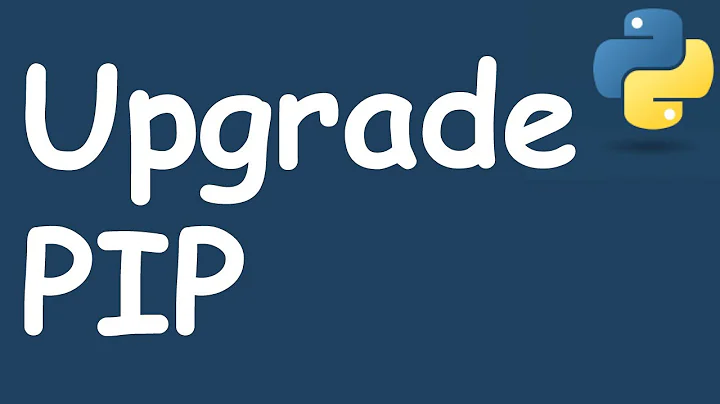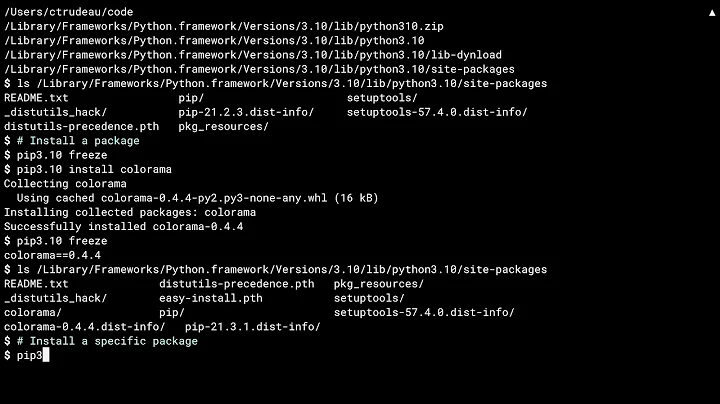Upgrade python packages from requirements.txt using pip command
Solution 1
No. Your requirements file has been pinned to specific versions. If your requirements are set to that version, you should not be trying to upgrade beyond those versions. If you need to upgrade, then you need to switch to unpinned versions in your requirements file.
Example:
lxml>=2.2.0
This would upgrade lxml to any version newer than 2.2.0
lxml>=2.2.0,<2.3.0
This would upgrade lxml to the most recent version between 2.2.0 and 2.3.0.
Solution 2
I already answered this question here. Here's my solution:
Because there was no easy way for upgrading package by package, and updating the requirements.txt file, I wrote this pip-upgrader which also updates the versions in your requirements.txt file for the packages chosen (or all packages).
Installation
pip install pip-upgrader
Usage
Activate your virtualenv (important, because it will also install the new versions of upgraded packages in current virtualenv).
cd into your project directory, then run:
pip-upgrade
Advanced usage
If the requirements are placed in a non-standard location, send them as arguments:
pip-upgrade path/to/requirements.txt
If you already know what package you want to upgrade, simply send them as arguments:
pip-upgrade -p django -p celery -p dateutil
If you need to upgrade to pre-release / post-release version, add --prerelease argument to your command.
Full disclosure: I wrote this package.
Solution 3
you can try:
pip install --upgrade --force-reinstall -r requirements.txt
You can also ignore installed package and install the new one :
pip install --ignore-installed -r requirements.txt
Solution 4
I suggest freezing all of your dependencies in order to have predictable builds.
When doing that, you can update all dependencies at once like this:
sed -i '' 's/[~=]=/>=/' requirements.txt
pip install -U -r requirements.txt
pip freeze | sed 's/==/~=/' > requirements.txt
Having done the above, test your project with the new set of packages and eventually commit the requirements.txt file to the repository while still allowing for installing hot-fixes.
Solution 5
Another solution is to use the upgrade-requirements package
pip install upgrade-requirements
And then run :
upgrade-requirements
It will upgrade all the packages that are not at their latest versions, and also create an updated requirements.txt at the end.
Related videos on Youtube
Comments
-
abhiomkar about 2 years
How do I upgrade all my python packages from requirements.txt file using pip command?
tried with below command
$ pip install --upgrade -r requirements.txtSince, the python packages are suffixed with the version number (
Django==1.5.1) they don't seem to upgrade. Is there any better approach than manually editing requirements.txt file?EDIT
As Andy mentioned in his answer packages are pinned to a specific version, hence it is not possible to upgrade packages through pip command.
But, we can achieve this with
pip-toolsusing the following command.$ pip-review --autothis will automatically upgrade all packages from requirements.txt (make sure to install
pip-toolsusing pip install command).-
erikreed over 7 yearsPip-tools is working great -- updated syntax is
pip-compile -U requirements.txt. -
mash over 3 yearsNow it's
pip install pip-review. pypi.org/project/pip-review
-
-
abhiomkar almost 10 yearswith that option it seems to reinstall the same version. As Andy mentioned in above answer, packages are pinned to specific version.
-
Freelancer almost 10 years@abhiomkar you're rigth I thought you wanted to re install the same version (maybe to add backport fix)
-
 AXO about 7 yearsThe second command is what I was looking for. Notice that
AXO about 7 yearsThe second command is what I was looking for. Notice that-Iand--ignore-installedare the same flags and of-course it's not valid to have a,in there. This way no downgrades will occur during install and after installation of requirements is complete one can upgrade installed packages usingpip-review --auto. -
 zhukovgreen almost 7 yearsI found helpful to do the following. 1. Deleted venv 2. Created a new one with the same name (the way to clean all pip packages) 3. Replace all == to >= in the requirements.txt 4. pip install -r requirements.txt 4.
zhukovgreen almost 7 yearsI found helpful to do the following. 1. Deleted venv 2. Created a new one with the same name (the way to clean all pip packages) 3. Replace all == to >= in the requirements.txt 4. pip install -r requirements.txt 4. -
Jacopofar over 6 yearsGreat! It's surprising that such a function is not present directly in pip
-
pulsejet about 6 yearsElegant! Super-glad I scrolled down to this :P
-
Pierre.Sassoulas over 5 yearsI just used this, and this is the best thing since f-strings.
-
mszaro over 5 yearsGreat tool. Thank you.
-
 Gal Avineri over 4 yearsVery useful tool! I also found another package called pur that upgrades the pinned versions as well
Gal Avineri over 4 yearsVery useful tool! I also found another package called pur that upgrades the pinned versions as well -
 philshem over 4 years
philshem over 4 yearssed 's/==/>=/g' requirements.txt > TMP_FILE && mv TMP_FILE requirements.txtwill replace all==with>= -
 fanni over 4 yearsThis is ideal example of the anti-pattern. What's wrong here: 1) The requirements.txt is a .txt file, but you've made it executable 2). There is a simple pip install -r requirements.txt command. So you can use requirements.txt file only for listing your project dependencies. 3) You're not using versions of the packages. 4) Not a common pattern, other developers do not nothing about how to use it. 5) Hard to use with CI/CD pipelines. Please don't use this example
fanni over 4 yearsThis is ideal example of the anti-pattern. What's wrong here: 1) The requirements.txt is a .txt file, but you've made it executable 2). There is a simple pip install -r requirements.txt command. So you can use requirements.txt file only for listing your project dependencies. 3) You're not using versions of the packages. 4) Not a common pattern, other developers do not nothing about how to use it. 5) Hard to use with CI/CD pipelines. Please don't use this example -
 rioted about 4 yearsthis is a bad idea becuase it will also add the requirements of all your requirements, resulting in an unnecessarily large requirements file. If you then decide to update a single dependency, you are likely to get version conflicts, unless you know which other requirements were added to your requirements file because of that package.
rioted about 4 yearsthis is a bad idea becuase it will also add the requirements of all your requirements, resulting in an unnecessarily large requirements file. If you then decide to update a single dependency, you are likely to get version conflicts, unless you know which other requirements were added to your requirements file because of that package. -
Robert Rendell over 3 yearsAwesome! It even gave me a warning when I hadn't activated my venv. It also gives you the option of which packages to upgrade after it finds all the new versions. Excellent work!
-
 Zack Plauché over 3 yearsFull disclosure: This package is epic.
Zack Plauché over 3 yearsFull disclosure: This package is epic. -
 Cameron Gagnon over 3 yearsBeautiful. Elegant. Easier than I was expecting. Use this answer if you don't mind the extra install!
Cameron Gagnon over 3 yearsBeautiful. Elegant. Easier than I was expecting. Use this answer if you don't mind the extra install! -
vidstige over 3 yearsthat's all good. So after a few months packages will have updates, how do you update those and again commit the .txt file?
-
 Zephaniah Grunschlag over 3 yearsThis is definitely the best solution, as it uses pip drrectly without having to install yet another package.
Zephaniah Grunschlag over 3 yearsThis is definitely the best solution, as it uses pip drrectly without having to install yet another package. -
 Emilio Ferreyra about 3 yearsThank you very much. This package is very useful.
Emilio Ferreyra about 3 yearsThank you very much. This package is very useful. -
 Hermes almost 3 yearsI updated my post so that it would better depict my approach. Assuming that the app is alive and actively developed, some changes are made to it from time to time. At some of these occasions its dependencies can be manually updated using the above approach. This may require some extra changes as there may be some incompatibilities. Other than that, the changes always go through CI/CD during which at least some hot-fixes can be applied thanks to
Hermes almost 3 yearsI updated my post so that it would better depict my approach. Assuming that the app is alive and actively developed, some changes are made to it from time to time. At some of these occasions its dependencies can be manually updated using the above approach. This may require some extra changes as there may be some incompatibilities. Other than that, the changes always go through CI/CD during which at least some hot-fixes can be applied thanks to~=in therequirements.txt. Since with~=no significant and breaking changes are to be expected, the builds can still be considered predictable. -
Rich Lysakowski PhD almost 3 yearsconda handles all these updating issues, and guarantees entire environment integrity. pip is greedy and selfish and only installs or updates (or downgrades) what it needs to install current packages, sometimes downgrading core packages and breaking things. Conda handles package and environment management at once. Upgrading pip AND venv OR virtualenv (OR pip-whatever is one more unnecessary headache. I use pip as the last resort in conda environment when conda packages are not available. This pip upgrader package makes it easier to tolerate pip when conda packages are not available.
-
shadow over 2 yearsDayum, what a great package, thanks for sharing!
-
 AnonymousUser over 2 yearsIt didn't work, I still have old version. It uninstalled the old version, then installed the old version again.
AnonymousUser over 2 yearsIt didn't work, I still have old version. It uninstalled the old version, then installed the old version again. -
 Oliver almost 2 yearsPip upgrader has been discontinued per its github page.
Oliver almost 2 yearsPip upgrader has been discontinued per its github page.






